Mobile App Development: FFBF Application Report and Project Analysis
VerifiedAdded on 2022/09/14
|13
|1874
|13
Report
AI Summary
This report provides a comprehensive overview of the FFBF mobile application project developed as part of Coursework 1. The report details the application's purpose, which is to help users discover London's finest restaurants and street food, and its functionality, including features for user registration, restaurant listings, and street food reviews. The project utilized the Waterfall Model methodology, outlining the major steps from system requirements to implementation and verification. The report highlights the learning outcomes, including enhanced Java programming skills and team management abilities. It also examines group dynamics, the most enjoyable aspects of the project, and areas where the team succeeded and could improve, such as UI design. The report also includes references to relevant academic sources. The application was developed in Android Studio and utilized Firebase for data storage and retrieval.
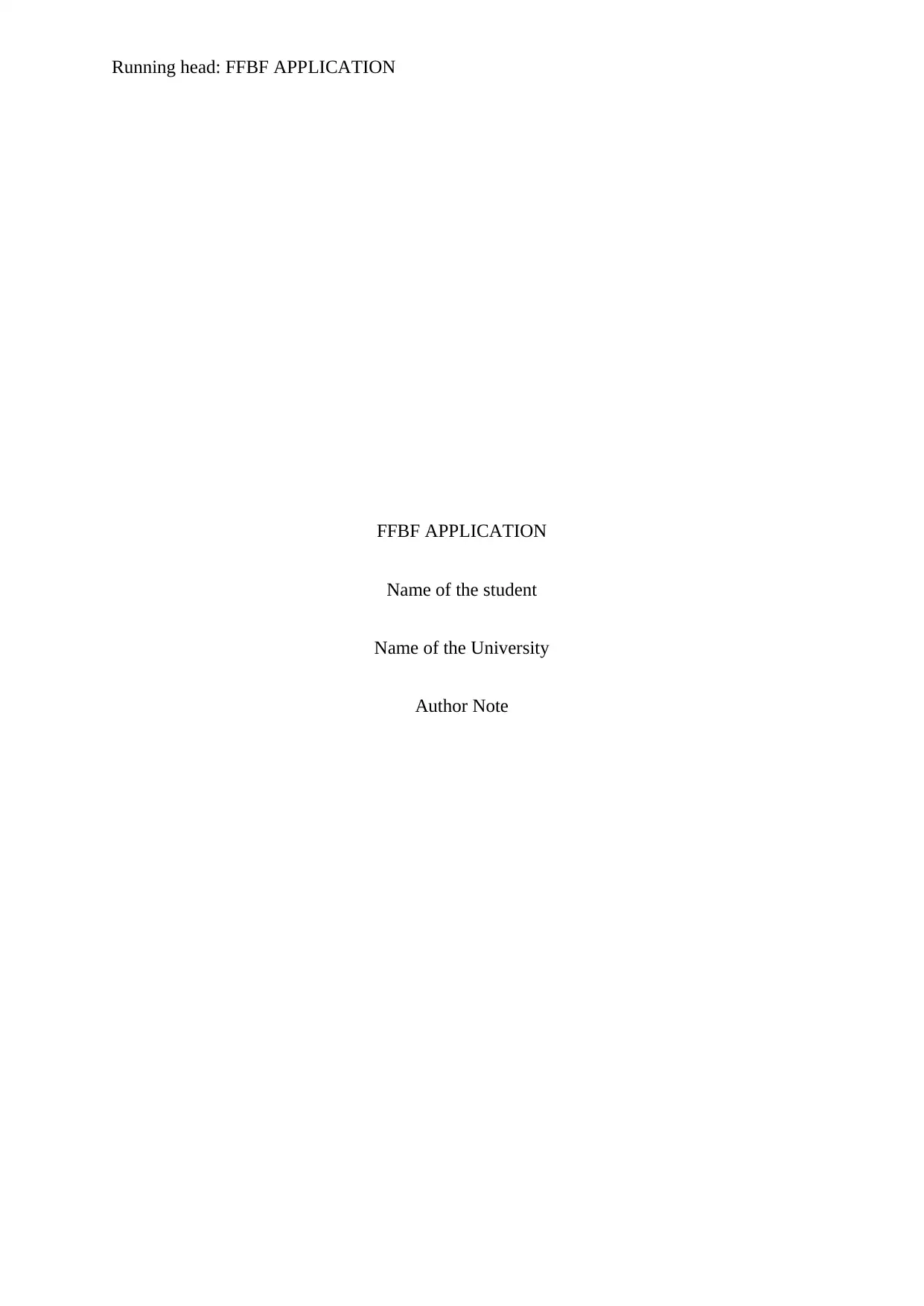
Running head: FFBF APPLICATION
FFBF APPLICATION
Name of the student
Name of the University
Author Note
FFBF APPLICATION
Name of the student
Name of the University
Author Note
Paraphrase This Document
Need a fresh take? Get an instant paraphrase of this document with our AI Paraphraser
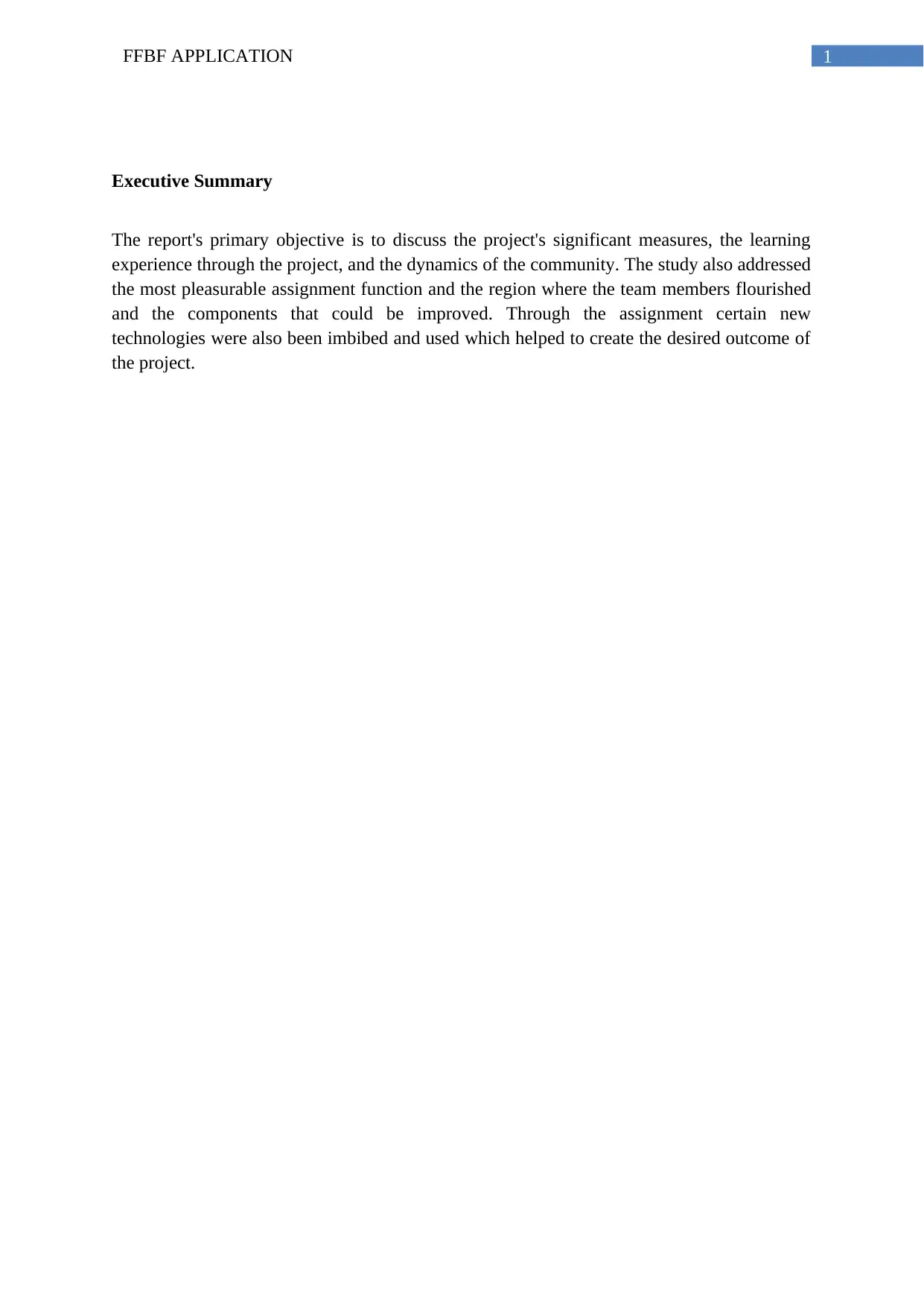
1FFBF APPLICATION
Executive Summary
The report's primary objective is to discuss the project's significant measures, the learning
experience through the project, and the dynamics of the community. The study also addressed
the most pleasurable assignment function and the region where the team members flourished
and the components that could be improved. Through the assignment certain new
technologies were also been imbibed and used which helped to create the desired outcome of
the project.
Executive Summary
The report's primary objective is to discuss the project's significant measures, the learning
experience through the project, and the dynamics of the community. The study also addressed
the most pleasurable assignment function and the region where the team members flourished
and the components that could be improved. Through the assignment certain new
technologies were also been imbibed and used which helped to create the desired outcome of
the project.
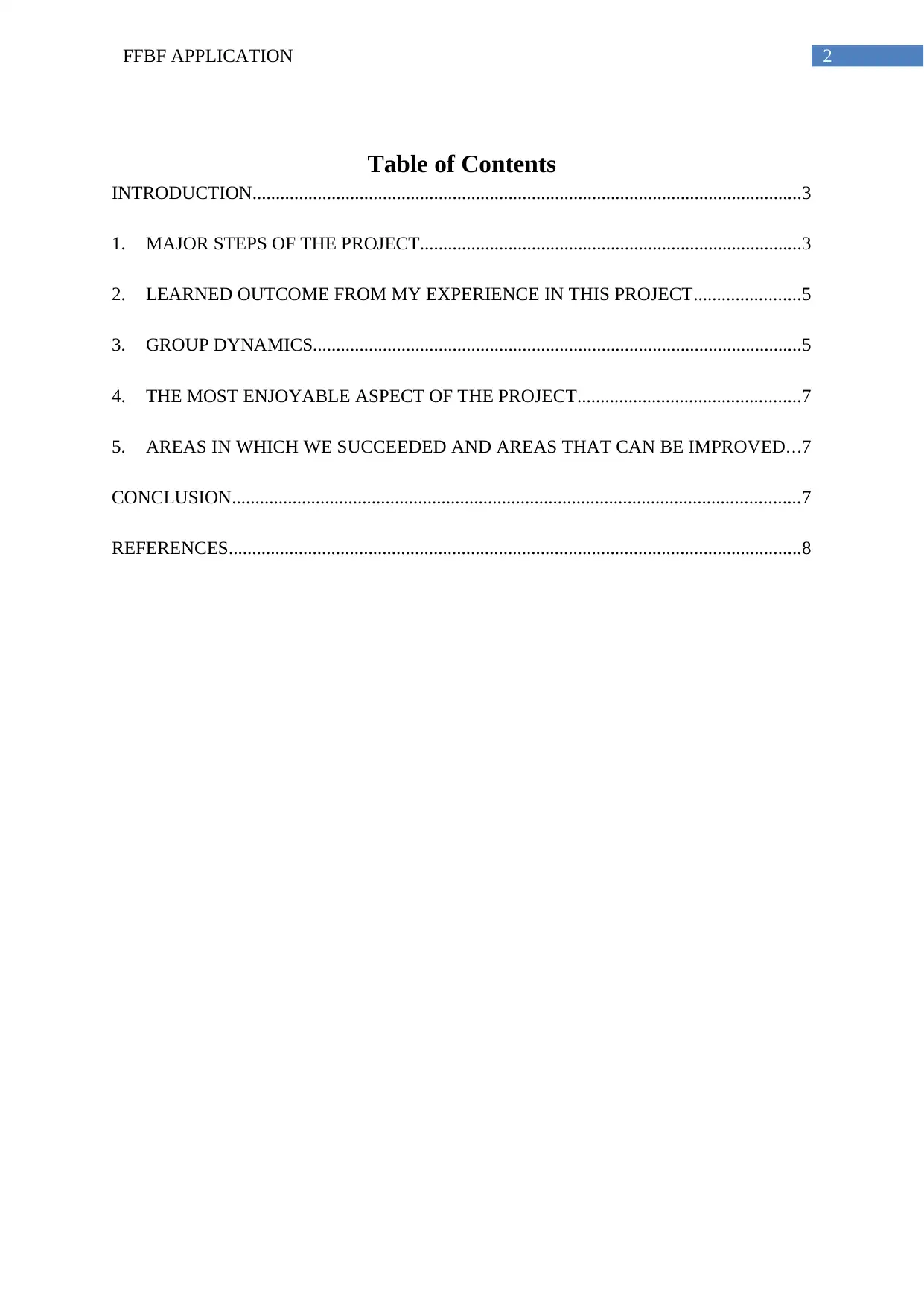
2FFBF APPLICATION
Table of Contents
INTRODUCTION......................................................................................................................3
1. MAJOR STEPS OF THE PROJECT..................................................................................3
2. LEARNED OUTCOME FROM MY EXPERIENCE IN THIS PROJECT.......................5
3. GROUP DYNAMICS.........................................................................................................5
4. THE MOST ENJOYABLE ASPECT OF THE PROJECT................................................7
5. AREAS IN WHICH WE SUCCEEDED AND AREAS THAT CAN BE IMPROVED...7
CONCLUSION..........................................................................................................................7
REFERENCES...........................................................................................................................8
Table of Contents
INTRODUCTION......................................................................................................................3
1. MAJOR STEPS OF THE PROJECT..................................................................................3
2. LEARNED OUTCOME FROM MY EXPERIENCE IN THIS PROJECT.......................5
3. GROUP DYNAMICS.........................................................................................................5
4. THE MOST ENJOYABLE ASPECT OF THE PROJECT................................................7
5. AREAS IN WHICH WE SUCCEEDED AND AREAS THAT CAN BE IMPROVED...7
CONCLUSION..........................................................................................................................7
REFERENCES...........................................................................................................................8
⊘ This is a preview!⊘
Do you want full access?
Subscribe today to unlock all pages.

Trusted by 1+ million students worldwide
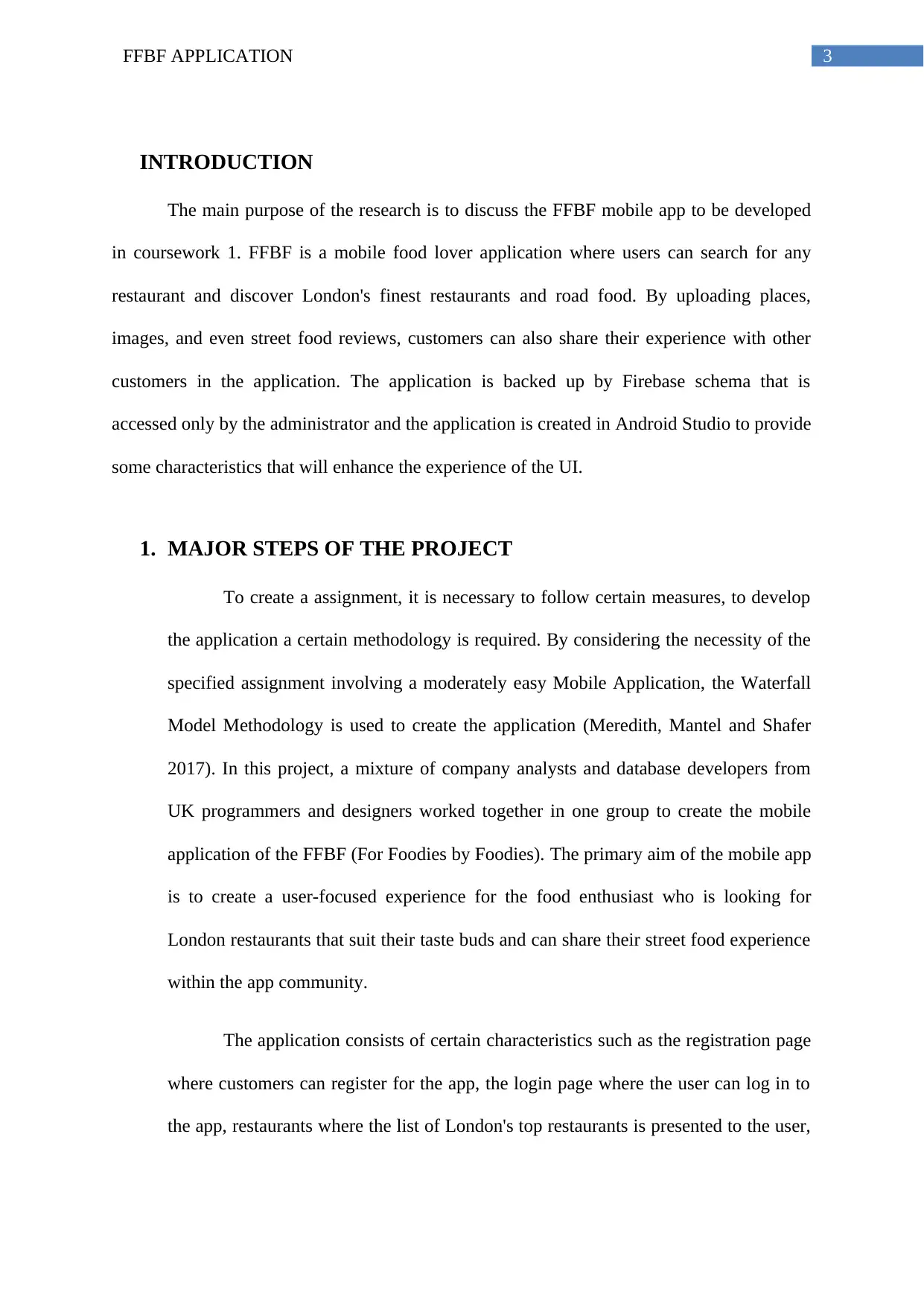
3FFBF APPLICATION
INTRODUCTION
The main purpose of the research is to discuss the FFBF mobile app to be developed
in coursework 1. FFBF is a mobile food lover application where users can search for any
restaurant and discover London's finest restaurants and road food. By uploading places,
images, and even street food reviews, customers can also share their experience with other
customers in the application. The application is backed up by Firebase schema that is
accessed only by the administrator and the application is created in Android Studio to provide
some characteristics that will enhance the experience of the UI.
1. MAJOR STEPS OF THE PROJECT
To create a assignment, it is necessary to follow certain measures, to develop
the application a certain methodology is required. By considering the necessity of the
specified assignment involving a moderately easy Mobile Application, the Waterfall
Model Methodology is used to create the application (Meredith, Mantel and Shafer
2017). In this project, a mixture of company analysts and database developers from
UK programmers and designers worked together in one group to create the mobile
application of the FFBF (For Foodies by Foodies). The primary aim of the mobile app
is to create a user-focused experience for the food enthusiast who is looking for
London restaurants that suit their taste buds and can share their street food experience
within the app community.
The application consists of certain characteristics such as the registration page
where customers can register for the app, the login page where the user can log in to
the app, restaurants where the list of London's top restaurants is presented to the user,
INTRODUCTION
The main purpose of the research is to discuss the FFBF mobile app to be developed
in coursework 1. FFBF is a mobile food lover application where users can search for any
restaurant and discover London's finest restaurants and road food. By uploading places,
images, and even street food reviews, customers can also share their experience with other
customers in the application. The application is backed up by Firebase schema that is
accessed only by the administrator and the application is created in Android Studio to provide
some characteristics that will enhance the experience of the UI.
1. MAJOR STEPS OF THE PROJECT
To create a assignment, it is necessary to follow certain measures, to develop
the application a certain methodology is required. By considering the necessity of the
specified assignment involving a moderately easy Mobile Application, the Waterfall
Model Methodology is used to create the application (Meredith, Mantel and Shafer
2017). In this project, a mixture of company analysts and database developers from
UK programmers and designers worked together in one group to create the mobile
application of the FFBF (For Foodies by Foodies). The primary aim of the mobile app
is to create a user-focused experience for the food enthusiast who is looking for
London restaurants that suit their taste buds and can share their street food experience
within the app community.
The application consists of certain characteristics such as the registration page
where customers can register for the app, the login page where the user can log in to
the app, restaurants where the list of London's top restaurants is presented to the user,
Paraphrase This Document
Need a fresh take? Get an instant paraphrase of this document with our AI Paraphraser
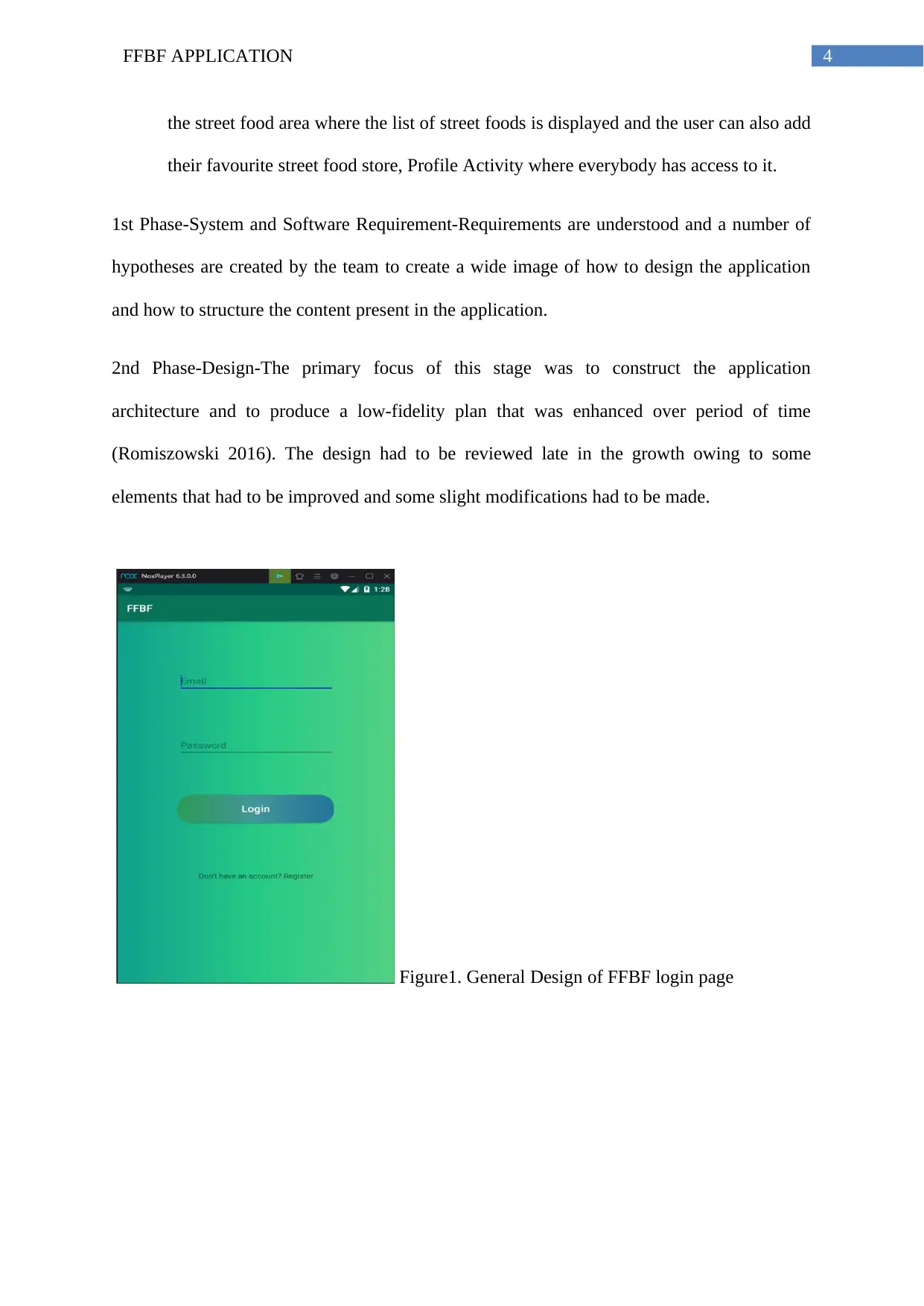
4FFBF APPLICATION
the street food area where the list of street foods is displayed and the user can also add
their favourite street food store, Profile Activity where everybody has access to it.
1st Phase-System and Software Requirement-Requirements are understood and a number of
hypotheses are created by the team to create a wide image of how to design the application
and how to structure the content present in the application.
2nd Phase-Design-The primary focus of this stage was to construct the application
architecture and to produce a low-fidelity plan that was enhanced over period of time
(Romiszowski 2016). The design had to be reviewed late in the growth owing to some
elements that had to be improved and some slight modifications had to be made.
Figure1. General Design of FFBF login page
the street food area where the list of street foods is displayed and the user can also add
their favourite street food store, Profile Activity where everybody has access to it.
1st Phase-System and Software Requirement-Requirements are understood and a number of
hypotheses are created by the team to create a wide image of how to design the application
and how to structure the content present in the application.
2nd Phase-Design-The primary focus of this stage was to construct the application
architecture and to produce a low-fidelity plan that was enhanced over period of time
(Romiszowski 2016). The design had to be reviewed late in the growth owing to some
elements that had to be improved and some slight modifications had to be made.
Figure1. General Design of FFBF login page
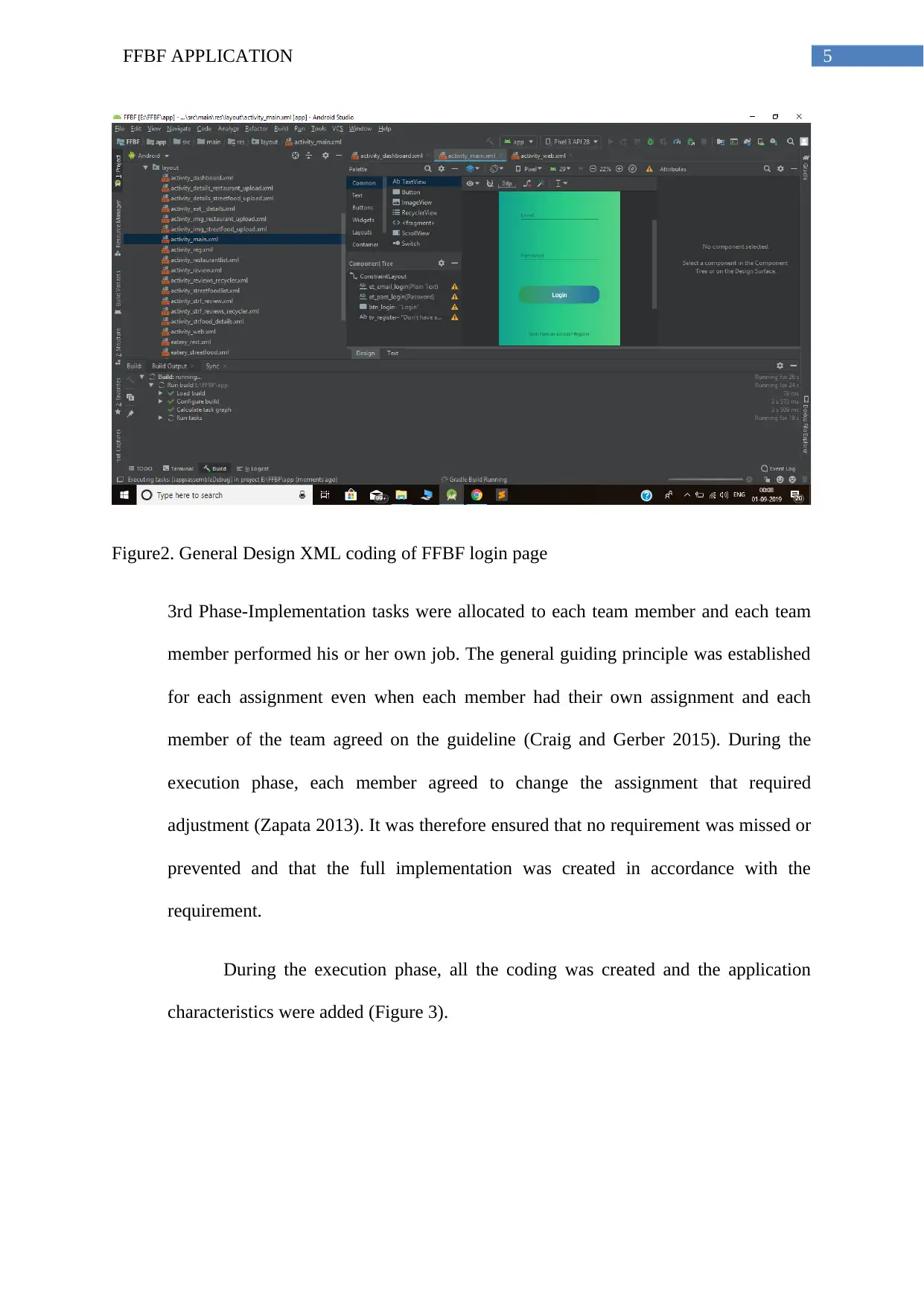
5FFBF APPLICATION
Figure2. General Design XML coding of FFBF login page
3rd Phase-Implementation tasks were allocated to each team member and each team
member performed his or her own job. The general guiding principle was established
for each assignment even when each member had their own assignment and each
member of the team agreed on the guideline (Craig and Gerber 2015). During the
execution phase, each member agreed to change the assignment that required
adjustment (Zapata 2013). It was therefore ensured that no requirement was missed or
prevented and that the full implementation was created in accordance with the
requirement.
During the execution phase, all the coding was created and the application
characteristics were added (Figure 3).
Figure2. General Design XML coding of FFBF login page
3rd Phase-Implementation tasks were allocated to each team member and each team
member performed his or her own job. The general guiding principle was established
for each assignment even when each member had their own assignment and each
member of the team agreed on the guideline (Craig and Gerber 2015). During the
execution phase, each member agreed to change the assignment that required
adjustment (Zapata 2013). It was therefore ensured that no requirement was missed or
prevented and that the full implementation was created in accordance with the
requirement.
During the execution phase, all the coding was created and the application
characteristics were added (Figure 3).
⊘ This is a preview!⊘
Do you want full access?
Subscribe today to unlock all pages.

Trusted by 1+ million students worldwide
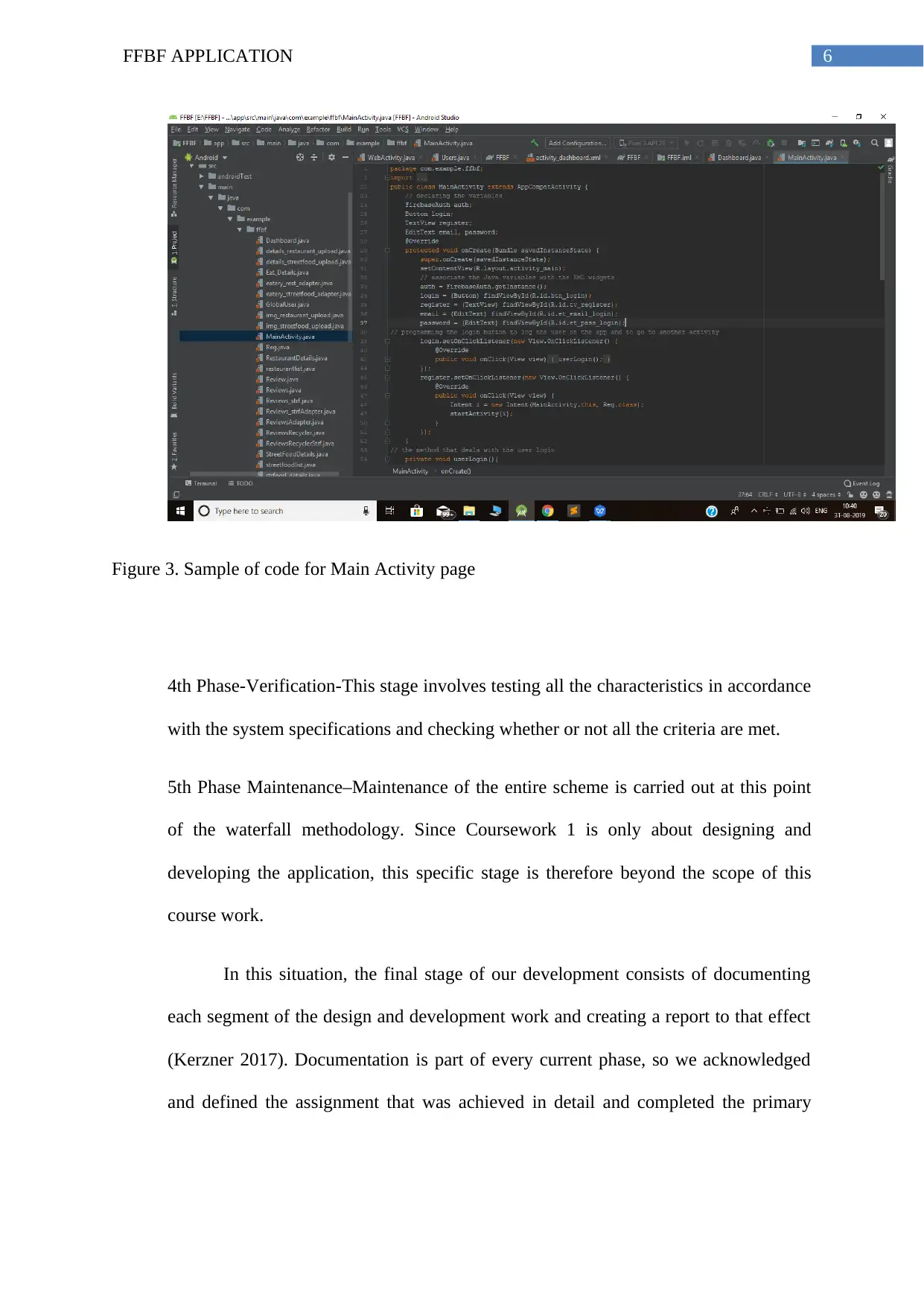
6FFBF APPLICATION
Figure 3. Sample of code for Main Activity page
4th Phase-Verification-This stage involves testing all the characteristics in accordance
with the system specifications and checking whether or not all the criteria are met.
5th Phase Maintenance–Maintenance of the entire scheme is carried out at this point
of the waterfall methodology. Since Coursework 1 is only about designing and
developing the application, this specific stage is therefore beyond the scope of this
course work.
In this situation, the final stage of our development consists of documenting
each segment of the design and development work and creating a report to that effect
(Kerzner 2017). Documentation is part of every current phase, so we acknowledged
and defined the assignment that was achieved in detail and completed the primary
Figure 3. Sample of code for Main Activity page
4th Phase-Verification-This stage involves testing all the characteristics in accordance
with the system specifications and checking whether or not all the criteria are met.
5th Phase Maintenance–Maintenance of the entire scheme is carried out at this point
of the waterfall methodology. Since Coursework 1 is only about designing and
developing the application, this specific stage is therefore beyond the scope of this
course work.
In this situation, the final stage of our development consists of documenting
each segment of the design and development work and creating a report to that effect
(Kerzner 2017). Documentation is part of every current phase, so we acknowledged
and defined the assignment that was achieved in detail and completed the primary
Paraphrase This Document
Need a fresh take? Get an instant paraphrase of this document with our AI Paraphraser
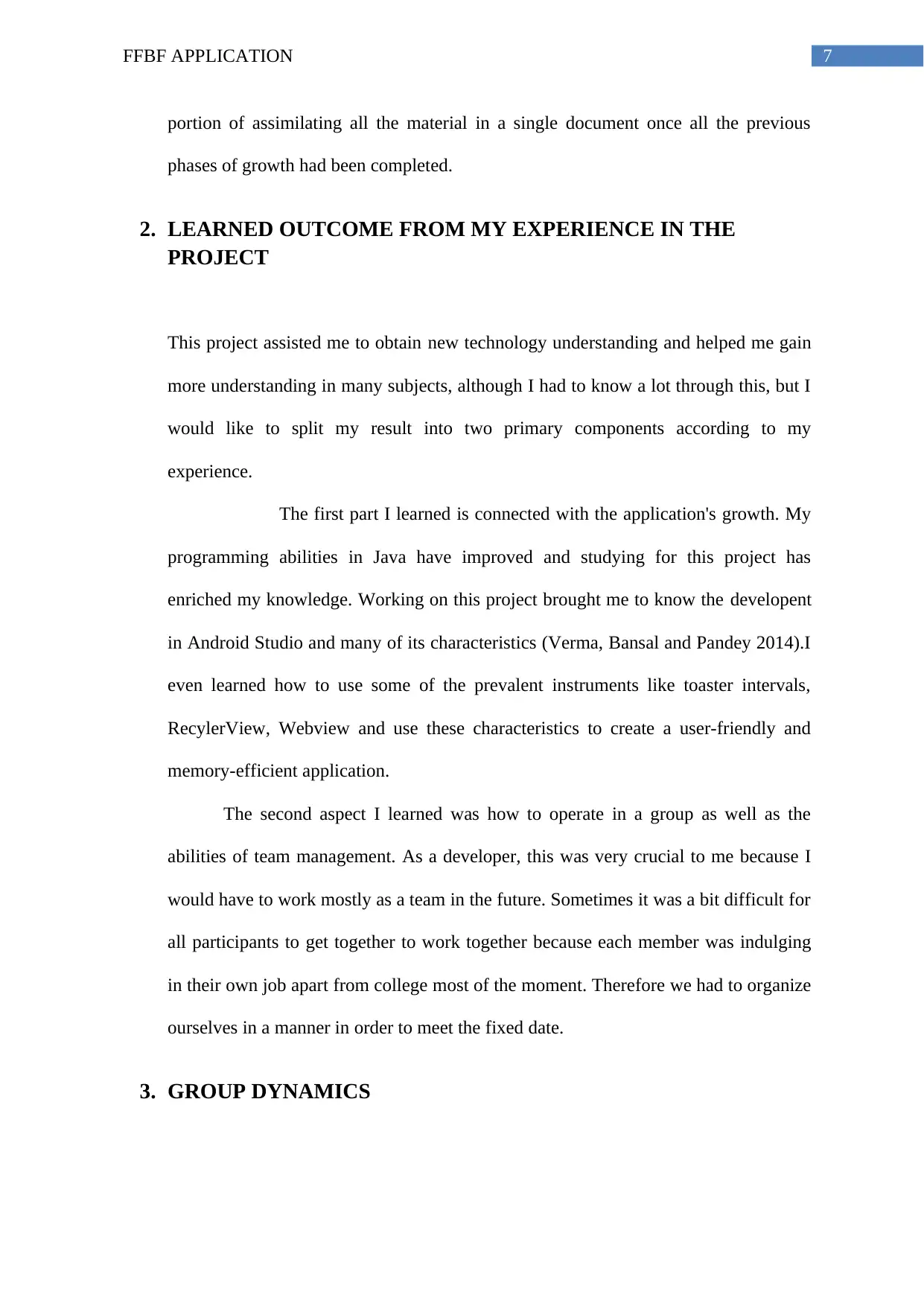
7FFBF APPLICATION
portion of assimilating all the material in a single document once all the previous
phases of growth had been completed.
2. LEARNED OUTCOME FROM MY EXPERIENCE IN THE
PROJECT
This project assisted me to obtain new technology understanding and helped me gain
more understanding in many subjects, although I had to know a lot through this, but I
would like to split my result into two primary components according to my
experience.
The first part I learned is connected with the application's growth. My
programming abilities in Java have improved and studying for this project has
enriched my knowledge. Working on this project brought me to know the developent
in Android Studio and many of its characteristics (Verma, Bansal and Pandey 2014).I
even learned how to use some of the prevalent instruments like toaster intervals,
RecylerView, Webview and use these characteristics to create a user-friendly and
memory-efficient application.
The second aspect I learned was how to operate in a group as well as the
abilities of team management. As a developer, this was very crucial to me because I
would have to work mostly as a team in the future. Sometimes it was a bit difficult for
all participants to get together to work together because each member was indulging
in their own job apart from college most of the moment. Therefore we had to organize
ourselves in a manner in order to meet the fixed date.
3. GROUP DYNAMICS
portion of assimilating all the material in a single document once all the previous
phases of growth had been completed.
2. LEARNED OUTCOME FROM MY EXPERIENCE IN THE
PROJECT
This project assisted me to obtain new technology understanding and helped me gain
more understanding in many subjects, although I had to know a lot through this, but I
would like to split my result into two primary components according to my
experience.
The first part I learned is connected with the application's growth. My
programming abilities in Java have improved and studying for this project has
enriched my knowledge. Working on this project brought me to know the developent
in Android Studio and many of its characteristics (Verma, Bansal and Pandey 2014).I
even learned how to use some of the prevalent instruments like toaster intervals,
RecylerView, Webview and use these characteristics to create a user-friendly and
memory-efficient application.
The second aspect I learned was how to operate in a group as well as the
abilities of team management. As a developer, this was very crucial to me because I
would have to work mostly as a team in the future. Sometimes it was a bit difficult for
all participants to get together to work together because each member was indulging
in their own job apart from college most of the moment. Therefore we had to organize
ourselves in a manner in order to meet the fixed date.
3. GROUP DYNAMICS
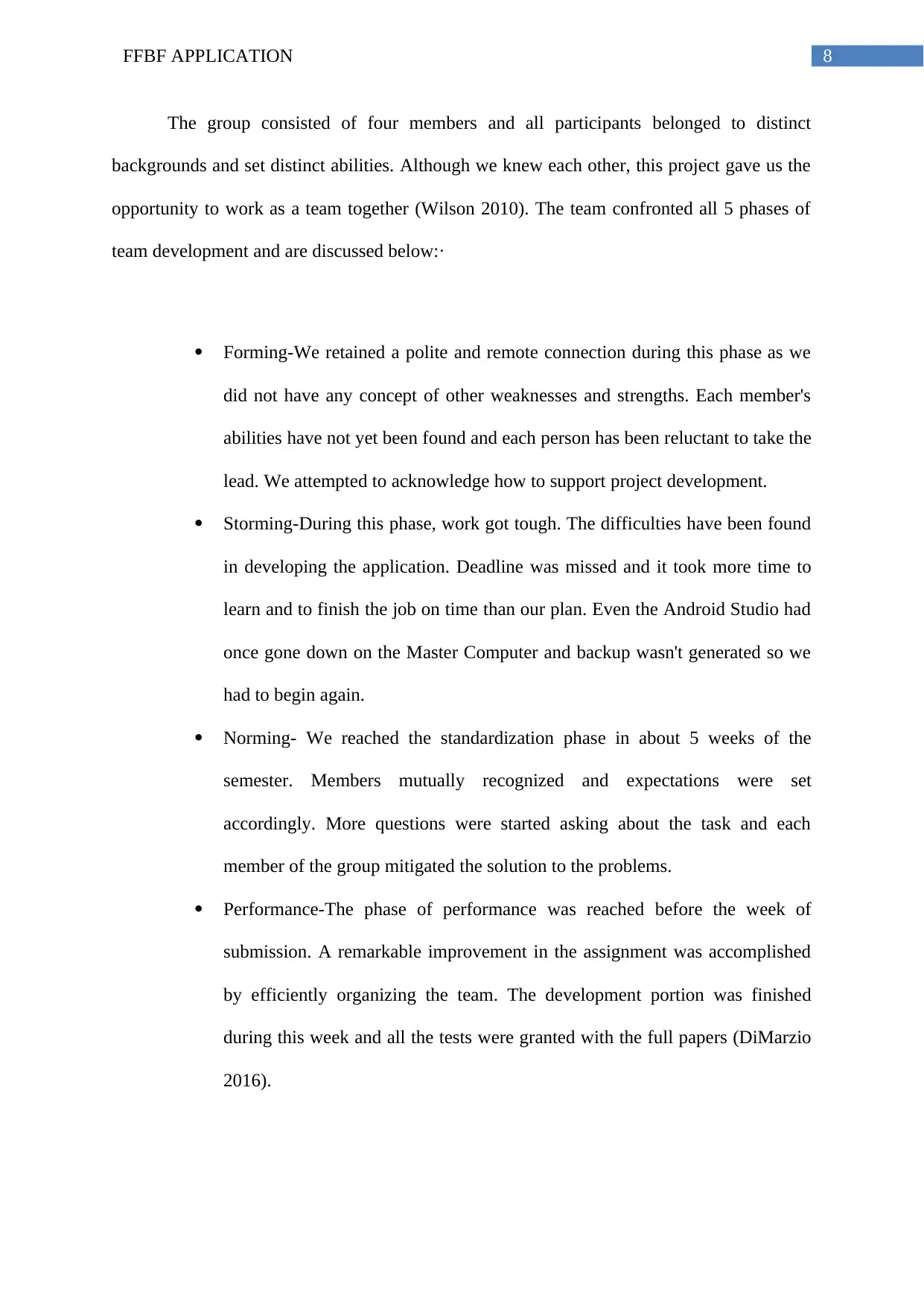
8FFBF APPLICATION
The group consisted of four members and all participants belonged to distinct
backgrounds and set distinct abilities. Although we knew each other, this project gave us the
opportunity to work as a team together (Wilson 2010). The team confronted all 5 phases of
team development and are discussed below:·
Forming-We retained a polite and remote connection during this phase as we
did not have any concept of other weaknesses and strengths. Each member's
abilities have not yet been found and each person has been reluctant to take the
lead. We attempted to acknowledge how to support project development.
Storming-During this phase, work got tough. The difficulties have been found
in developing the application. Deadline was missed and it took more time to
learn and to finish the job on time than our plan. Even the Android Studio had
once gone down on the Master Computer and backup wasn't generated so we
had to begin again.
Norming- We reached the standardization phase in about 5 weeks of the
semester. Members mutually recognized and expectations were set
accordingly. More questions were started asking about the task and each
member of the group mitigated the solution to the problems.
Performance-The phase of performance was reached before the week of
submission. A remarkable improvement in the assignment was accomplished
by efficiently organizing the team. The development portion was finished
during this week and all the tests were granted with the full papers (DiMarzio
2016).
The group consisted of four members and all participants belonged to distinct
backgrounds and set distinct abilities. Although we knew each other, this project gave us the
opportunity to work as a team together (Wilson 2010). The team confronted all 5 phases of
team development and are discussed below:·
Forming-We retained a polite and remote connection during this phase as we
did not have any concept of other weaknesses and strengths. Each member's
abilities have not yet been found and each person has been reluctant to take the
lead. We attempted to acknowledge how to support project development.
Storming-During this phase, work got tough. The difficulties have been found
in developing the application. Deadline was missed and it took more time to
learn and to finish the job on time than our plan. Even the Android Studio had
once gone down on the Master Computer and backup wasn't generated so we
had to begin again.
Norming- We reached the standardization phase in about 5 weeks of the
semester. Members mutually recognized and expectations were set
accordingly. More questions were started asking about the task and each
member of the group mitigated the solution to the problems.
Performance-The phase of performance was reached before the week of
submission. A remarkable improvement in the assignment was accomplished
by efficiently organizing the team. The development portion was finished
during this week and all the tests were granted with the full papers (DiMarzio
2016).
⊘ This is a preview!⊘
Do you want full access?
Subscribe today to unlock all pages.

Trusted by 1+ million students worldwide
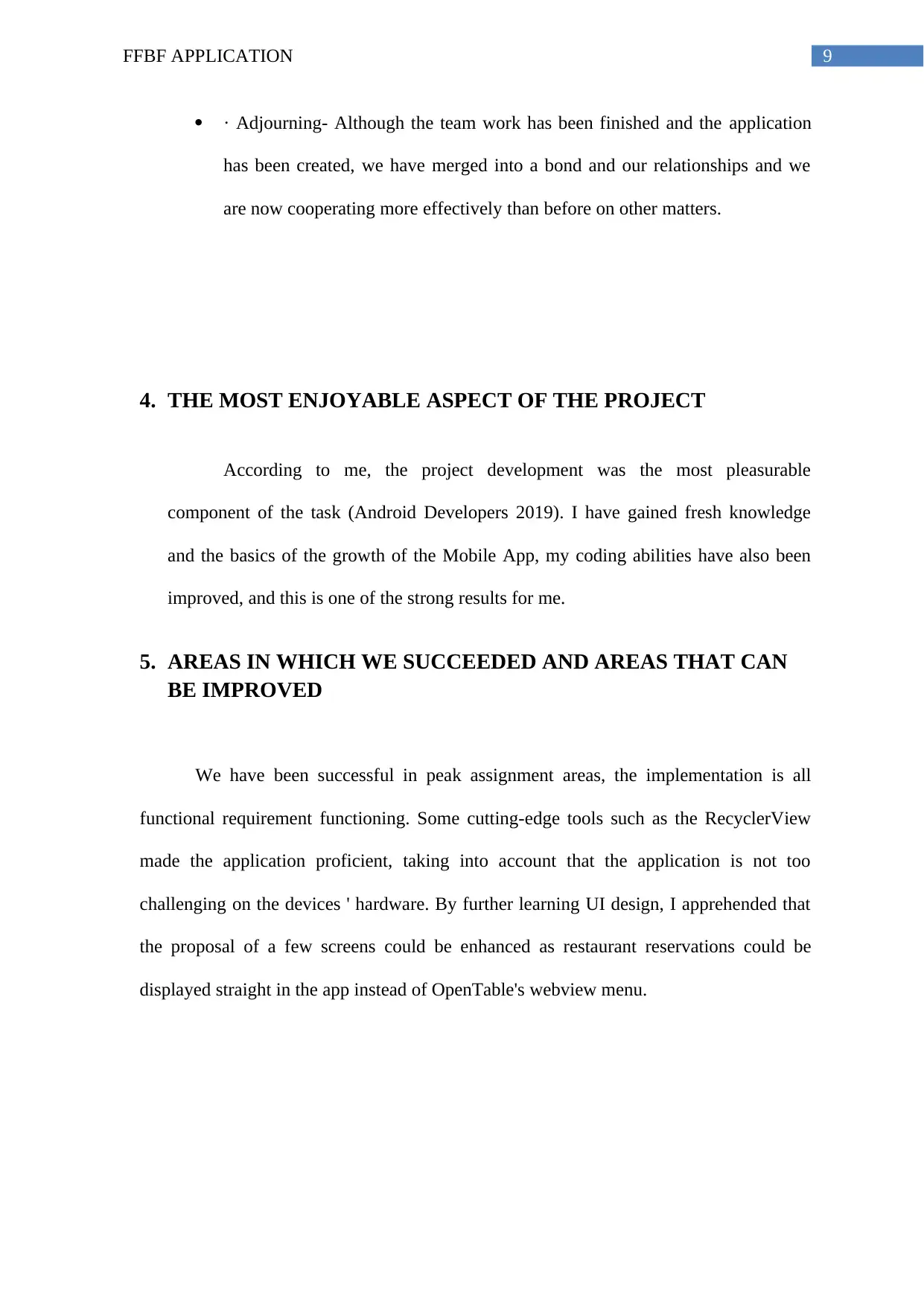
9FFBF APPLICATION
· Adjourning- Although the team work has been finished and the application
has been created, we have merged into a bond and our relationships and we
are now cooperating more effectively than before on other matters.
4. THE MOST ENJOYABLE ASPECT OF THE PROJECT
According to me, the project development was the most pleasurable
component of the task (Android Developers 2019). I have gained fresh knowledge
and the basics of the growth of the Mobile App, my coding abilities have also been
improved, and this is one of the strong results for me.
5. AREAS IN WHICH WE SUCCEEDED AND AREAS THAT CAN
BE IMPROVED
We have been successful in peak assignment areas, the implementation is all
functional requirement functioning. Some cutting-edge tools such as the RecyclerView
made the application proficient, taking into account that the application is not too
challenging on the devices ' hardware. By further learning UI design, I apprehended that
the proposal of a few screens could be enhanced as restaurant reservations could be
displayed straight in the app instead of OpenTable's webview menu.
· Adjourning- Although the team work has been finished and the application
has been created, we have merged into a bond and our relationships and we
are now cooperating more effectively than before on other matters.
4. THE MOST ENJOYABLE ASPECT OF THE PROJECT
According to me, the project development was the most pleasurable
component of the task (Android Developers 2019). I have gained fresh knowledge
and the basics of the growth of the Mobile App, my coding abilities have also been
improved, and this is one of the strong results for me.
5. AREAS IN WHICH WE SUCCEEDED AND AREAS THAT CAN
BE IMPROVED
We have been successful in peak assignment areas, the implementation is all
functional requirement functioning. Some cutting-edge tools such as the RecyclerView
made the application proficient, taking into account that the application is not too
challenging on the devices ' hardware. By further learning UI design, I apprehended that
the proposal of a few screens could be enhanced as restaurant reservations could be
displayed straight in the app instead of OpenTable's webview menu.
Paraphrase This Document
Need a fresh take? Get an instant paraphrase of this document with our AI Paraphraser
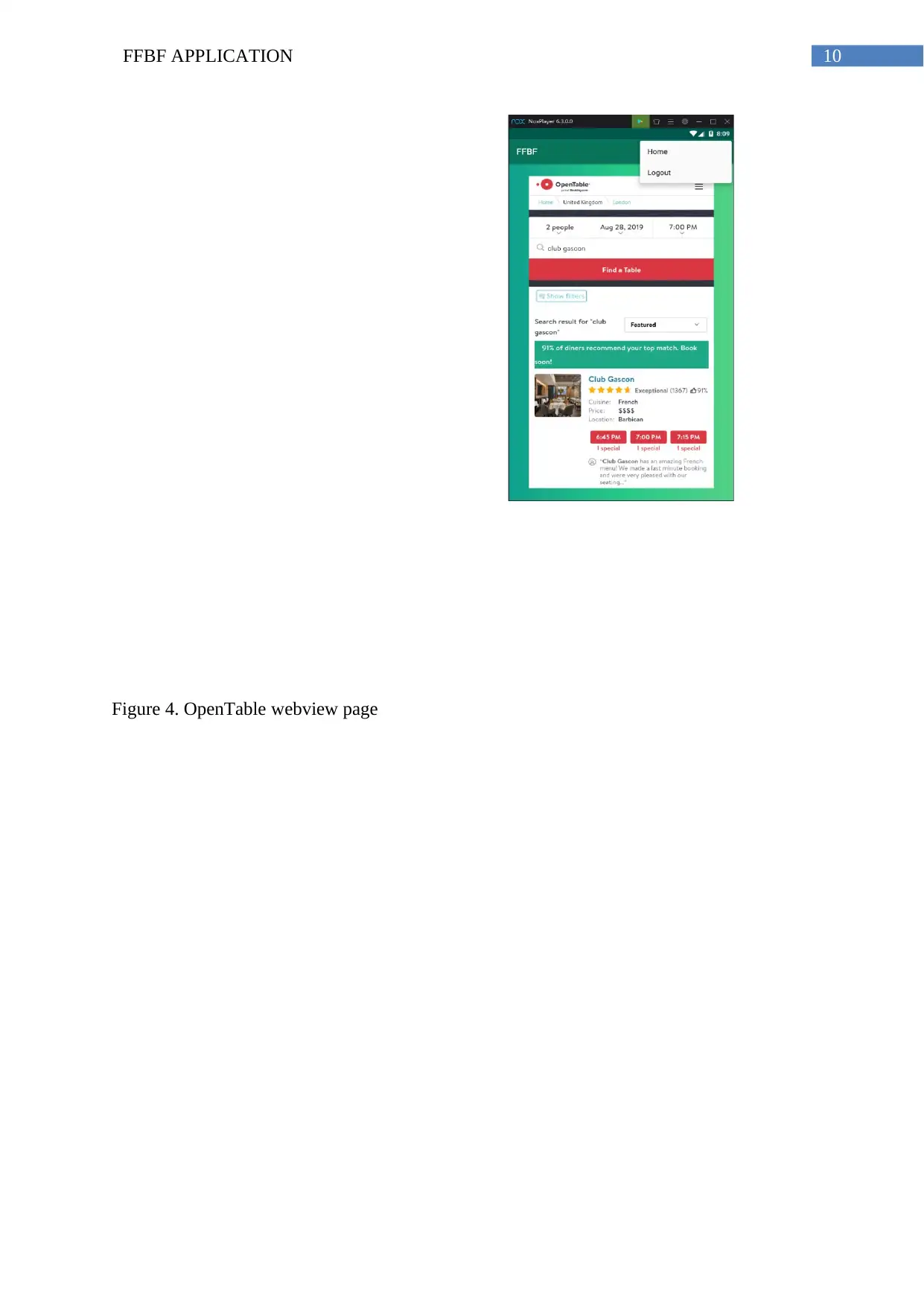
10FFBF APPLICATION
Figure 4. OpenTable webview page
Figure 4. OpenTable webview page
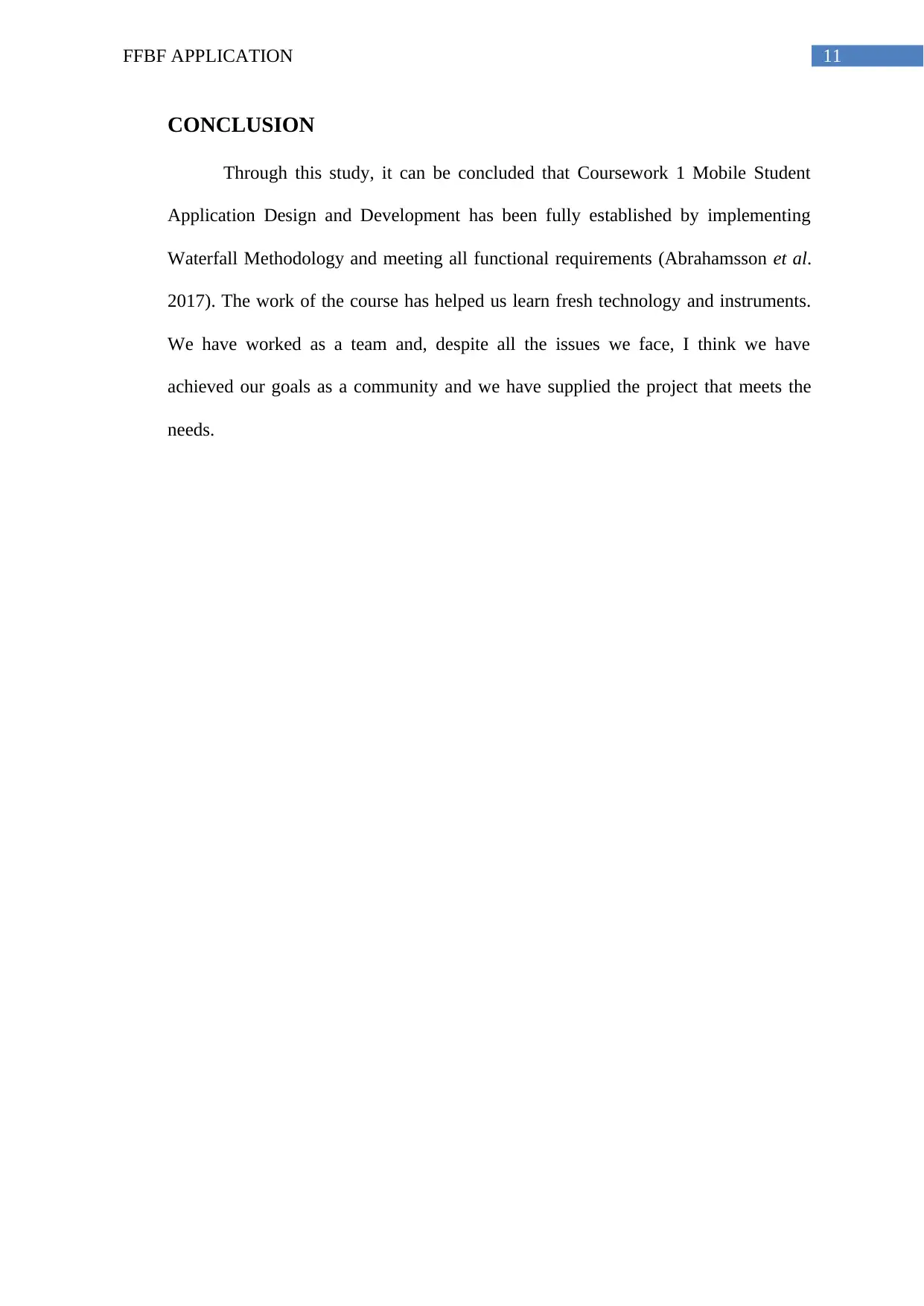
11FFBF APPLICATION
CONCLUSION
Through this study, it can be concluded that Coursework 1 Mobile Student
Application Design and Development has been fully established by implementing
Waterfall Methodology and meeting all functional requirements (Abrahamsson et al.
2017). The work of the course has helped us learn fresh technology and instruments.
We have worked as a team and, despite all the issues we face, I think we have
achieved our goals as a community and we have supplied the project that meets the
needs.
CONCLUSION
Through this study, it can be concluded that Coursework 1 Mobile Student
Application Design and Development has been fully established by implementing
Waterfall Methodology and meeting all functional requirements (Abrahamsson et al.
2017). The work of the course has helped us learn fresh technology and instruments.
We have worked as a team and, despite all the issues we face, I think we have
achieved our goals as a community and we have supplied the project that meets the
needs.
⊘ This is a preview!⊘
Do you want full access?
Subscribe today to unlock all pages.

Trusted by 1+ million students worldwide
1 out of 13
Related Documents
Your All-in-One AI-Powered Toolkit for Academic Success.
+13062052269
info@desklib.com
Available 24*7 on WhatsApp / Email
![[object Object]](/_next/static/media/star-bottom.7253800d.svg)
Unlock your academic potential
Copyright © 2020–2026 A2Z Services. All Rights Reserved. Developed and managed by ZUCOL.




